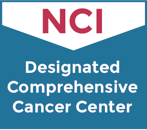Find a doctor
Our specialists work in teams, tailoring treatment to your individual needs.
Select a doctorGIVE CANCER HELL
“Cancer does not discriminate. Neither will we. Bold moves only. Cancer doesn’t see us coming. This fight is and always will be personal. We know what we gotta do.”
Research is central to our mission
How we’re fighting cancer
Keep up with the latest discoveries and innovations from our doctors and scientists.
- New computer models shed more light on how cancer behaves (Cell, Aug. 21, 2025)
- New therapy may help improve quality of life for cancer patients (Cell, Aug. 7, 2025)
Background image: The arm of a researcher wearing a white lab coat and white gloves grabbing a test tube on a counter in a research lab.


